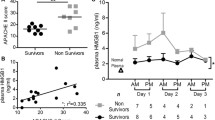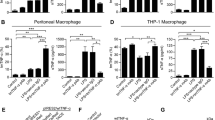Abstract
Bacterial infection of the mammalian bloodstream can lead to overwhelming sepsis, a potentially fatal syndrome of irreversible cardiovascular collapse (shock) and critical organ failure. Cachectin, also known as tumour necrosis factor, is a macrophage-derived peptide hormone released in response to bacterial lipopolysaccharide, and it has been implicated as a principal mediator of endotoxic shock, although its function in bacterial sepsis is not known. Anaesthetized baboons were passively immunized against endogenous cachectin and subsequently infused with an LD100 dose of live Escherichia coli. Control animals (not immunized against cachectin) developed hypotension followed by lethal renal and pulmonary failure. Neutralizing monoclonal anti-cachectin antibody fragments (F(ab′)2) administered to baboons only one hour before bacterial challenge protected against shock, but did not prevent critical organ failure. Complete protection against shock, vital organ dysfunction, persistent stress hormone release and death was conferred by administration of antibodies 2 h before bacterial infusion. These results indicate that cachectin is a mediator of fatal bacteraemic shock, and suggest that antibodies against cachectin offer a potential therapy of life-threatening infection.
Similar content being viewed by others
References
1. Kreger, B. E. W., Craven, D. E. & McCabe, W. R. Am. J. Med. 68, 344-355 (1980). 2. Ziegler, E. J. el al New Engl. J. Med, 307, 1225-1230 (1982). 3. Gilbert, R. P. Physiol. Rev. 40, 245-279 (1960). 4. Beutler, B. & Cerami, A. Nature 320, 584-588 (1986). 5. Beutler, B. & Cerami, A. New Engl. J. Med. 316, 379-385 (1987). 6. Tracey, K. J., Lowry, S. F. & Cerami, A. in TNF and Related Cytotoxins. CIBA Found. Symp. 131, 88-108 (Wiley, London, 1987). 7. Tracey, K. J., Lowry, S. F. & Cerami, A. J. infect. Dis. (in the press). 8. Beutler, B., Milsark, I. W. & Cerami, A. J. Immun. 135, 3972-3977 (1985). 9. Tracey, K. J. et al. Science 234, 470-474 (1986). 10. Tracey, K. J. et al. Surg. gynecol. Obstet. 164, 415-422 (1987). 11. Beutler, B., Milsark, I. W. & Cerami, A. Science 229, 869-871 (1985). 12. Cryer, P. E., Herman, C. M. & Sode, J. Ann. Surg. 174, 91-100 (1971). 13. Coalson, J. J., Hinshaw, L. B., Guenter, C. A., Berrel, E. L. & Greenfield, L. J. Lab. Invest. 32, 561-569 (1975). 14. Hesse, D. G. et al. Surg. gynecol. Obstet. (in the press). 15. Lowry, S. F. in Advances in Host Defense Mechanisms Vol. 6 (eds Gallin, J. I. & Fauci, A. S.) 169-190 (Raven, New York, 1986). 16. McCabe, W. R. New Engl. J. Med. 288, 21-23 (1973). 17. Dinarello, C. A. et al. J. exp. Med. 163, 1433-1450 (1986). 18. Darius, H., Lefer, D. J., Smith, J. B. & Lefer, A. M. Science 232, 58-60 (1986). 19. Chang, S. W., Feddersen, C. O., Henson, P. M. & Voelkel, N. F. J. din. Invest. 79,1498-1509 (1987). 20. Scuderi, P. et al. Lancet ii, 1364-1365 (1986). 21. Tracey, K. J. et al. Surg. Forum 37, 13-15 (1986). 22. Waage, A., Halstensen, A. & Espevik, T. Lancet i, 355-357 (1987). 23. Pool, J. L. Surg. gynecol. Obstet. 132, 1-9 (1971). 24. Parham, P. J. Immun. 131, 2895-2899 (1983). 25. Peters, P. M. et al. J. Immun. 137, 2592-2598 (1986). 26. Carswell, E. A. et al. Proc. natn. Acad. Sci. U.S.A. 72, 3666-3670 (1975). 27. Passon, P. G. & Peuler, J. D. Analyt. Biochem. 51, 618-631 (1973). 28. Aquilar-Parada, A., Eisentraut, E. M. & Unger, R. H. Diabetes 18, 717-723 (1969).
Author information
Authors and Affiliations
Rights and permissions
About this article
Cite this article
Tracey, K., Fong, Y., Hesse, D. et al. Anti-cachectin/TNF monoclonal antibodies prevent septic shock during lethal bacteraemia. Nature 330, 662–664 (1987). https://doi.org/10.1038/330662a0
Received:
Accepted:
Issue Date:
DOI: https://doi.org/10.1038/330662a0
- Springer Nature Limited
This article is cited by
-
Immune dysregulation in sepsis: experiences, lessons and perspectives
Cell Death Discovery (2023)
-
The Non-medical Switch from Reference Adalimumab to Biosimilar Adalimumab is Highly Successful in a Large Cohort of Patients with Stable Inflammatory Rheumatic Joint Diseases: A Real-Life Observational Study
Rheumatology and Therapy (2022)
-
Electroacupuncture Alleviate Lung Injury of Sepsis Through α7nAChR and NF-κB Signaling Pathway
Intensive Care Research (2022)
-
Stratification of hospitalized COVID-19 patients into clinical severity progression groups by immuno-phenotyping and machine learning
Nature Communications (2022)
-
Role of the adaptive immune response in sepsis
Intensive Care Medicine Experimental (2020)





